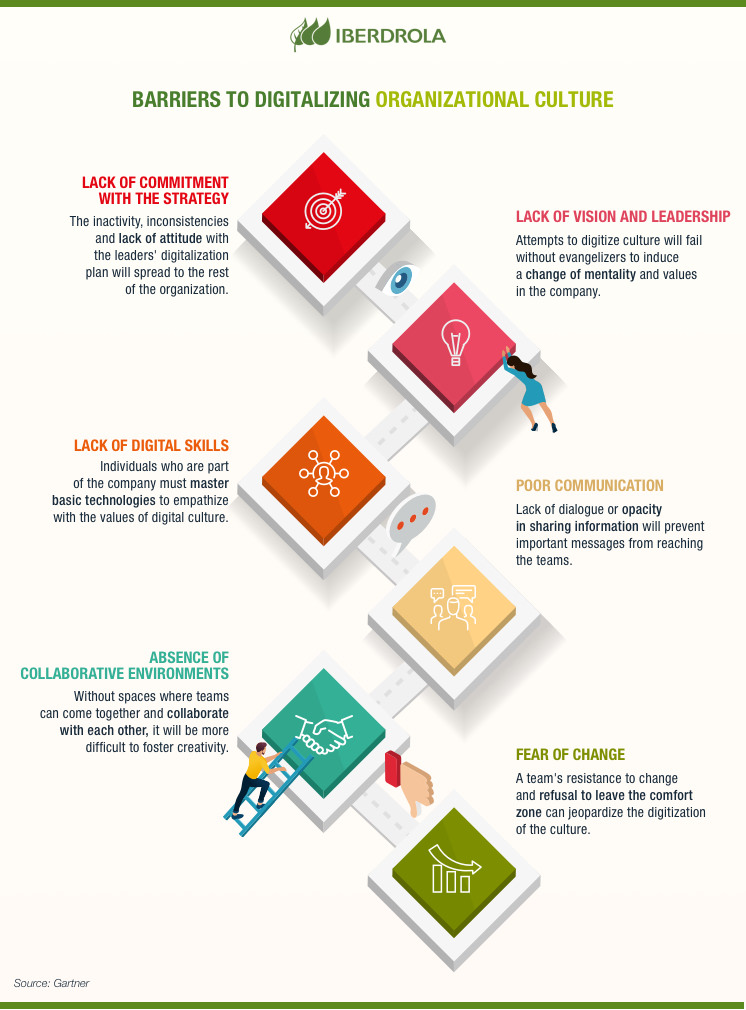Corporate digital transformation
Corporate culture in the digital era
Internet Social transformation
Digital transformation is the key to business competitiveness in a changing and increasingly demanding market. However, for this technological reform to be successfully completed, a corporate culture is needed to promote innovation and creativity within companies.

Digitalization in not an option for companies, it´s an obligation. Such a realization stems from the data extracted from the 2018 IT Transformation Maturity Curve survey carried out by ESG (Enterprise Strategy Group) to executives from all over the world. Right now 96% of companies are immersed in some kind of digital transformation process. Likewise, 81% of those surveyed consider that companies that do not digitise will cease to be competitive.
In terms of investment, the consulting firm International Data Corporation (IDC) predicted at the end of 2018 that in 2019 1.25 trillion dollars will be spent in the world on technologies and services needed to undertake the corporate digital transformation. According to this prediction, over half of this amount will be spent in Chinese and the USA markets. The global expenditure forecast for 2022 amounts to almost 2 trillion dollars, representing a compound annual growth rate of 16.7% compared with 2017. IDC also points out that 30% of the most important companies on the international scene, those on the Forbes Global 2000 list, will devote at least 10% of their revenues to boosting their digital strategies by 2020.
A favourable environment for digitisation and new technologies
At the same time as technological investment increases, the corporate digital transformation raises other basic needs to be completed successfully. For example, a change in corporate culture. The reform of the set of beliefs, values, habits and experiences that define a company through its workers is one of the greatest challenges in the digital age. In 2017, the consulting firm Capgemini assessed the weight of corporate culture in the digital transformation with a survey to executives and employees from all over the world. 62% of those interviewed highlighted corporate culture as the main difficulty that companies have in the digitalization process.
This is because the corporate culture reflects the spirit of the company, its way of thinking and acting, its values, its ethics, its corporate purpose. Hence, a profound change such as the digital transformation needs an environment positive towards technological innovation in order to take root and develop. Otherwise, any attempt at technological reform has little chance of succeeding or being properly implemented. Digitalization must be a progressive and constant process, driven by the development of technology and the claims of consumers and employees, who demand more agility and personalization from companies.

SEE INFOGRAPHIC: Barriers to digitalizing organizational culture [PDF]
How to adapt corporate culture to the digital age?
The first change is through the individuals who make up the company. It is essential that managers and employees acquire digital skills in order to face the digital transformation. In addition, creating spaces where innovation and the exchange of ideas are fostered will allow team leaders to quickly identify weaknesses in the company or requests among its employees. And this implementation must be done at different levels:
- Management
Directors must believe in the digitalization and pass it on to the rest of the workforce. Then, the area managers need to support the strategy and be an example: they will be the first to add new tools, promote and control the implementation of new technologies in the company, keep an eye on what is new and measure the results in order to progress towards a full digital transformation.
- Equipment
Digitalization must be adapted to the needs of the teams and provide them with tools to speed up their work. Each department may have very different problems and needs, so individual analysis and communication between them helps decipher the essential aspects of the business and digital transformation.
- Environment
Businesses must pay attention to the environment to identify the pitfalls that prevent teams from being more productive. By locating these obstacles, more dynamic spaces can be created to benefit their well-being and performance. Enabling collaborative zones or video conferencing rooms, for example, can improve the work of departments if used properly.




